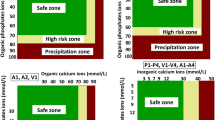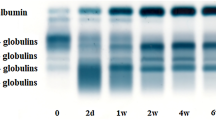Abstract
AMONG substances present in the amniotic fluid, the protein fractions and mineral components preserving osmotic equilibrium between the amnion and the growing embryo itself are especially significant for the development of the embryo.
This is a preview of subscription content, access via your institution
Access options
Subscribe to this journal
Receive 51 print issues and online access
$199.00 per year
only $3.90 per issue
Buy this article
- Purchase on Springer Link
- Instant access to full article PDF
Prices may be subject to local taxes which are calculated during checkout
Similar content being viewed by others
References
Weichselbaum, T. H., Amer. J. Clin. Path., 10, 40 (1946).
Kamei, Terumi, Z. physiol. Chem., 171, 101 (1927).
Marshall, M. E., and Deutsch, H. F., J. Biol. Chem., 185, 155 (1950).
Author information
Authors and Affiliations
Rights and permissions
About this article
Cite this article
SMOCZKIEWICZOWA, A. Sodium, Potassium, Calcium and Chloride Ion Contents and Protein Fractions in the Fluids of Chick Embryos. Nature 183, 1260–1261 (1959). https://doi.org/10.1038/1831260a0
Issue Date:
DOI: https://doi.org/10.1038/1831260a0
Comments
By submitting a comment you agree to abide by our Terms and Community Guidelines. If you find something abusive or that does not comply with our terms or guidelines please flag it as inappropriate.



